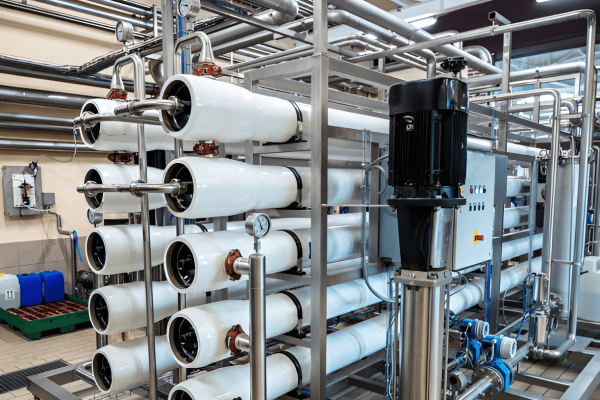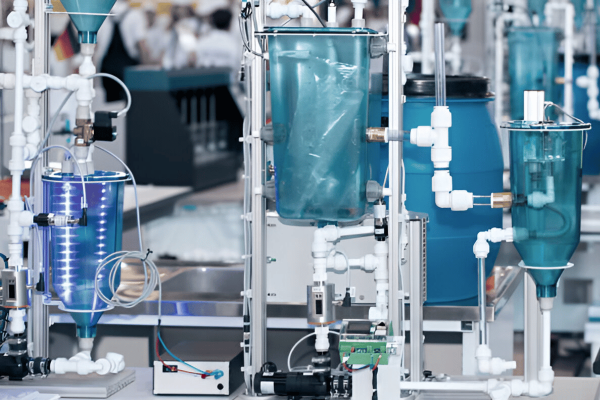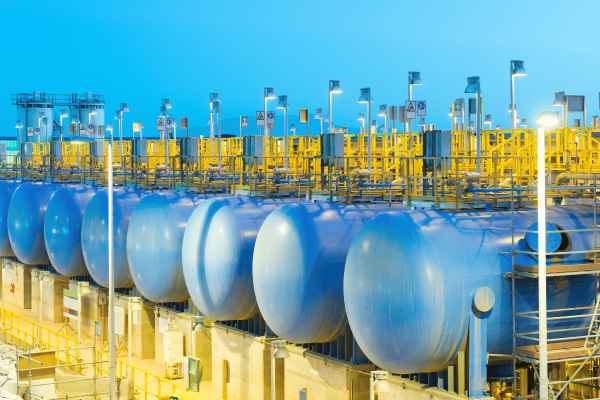Blog
Dubai’s Water Future: Smart Tech, Sustainable Cities, and the Next Wave of Innovation

A Desalination Facility Located along the Shores of the Arabian Gulf.
Dubai’s rapid urbanization and ambitious growth demand innovative solutions for water security. With limited natural freshwater resources and a growing population, water treatment plants in Dubai are critical to meeting daily needs for residents, industries, and businesses. As the city navigates challenges like high desalination costs and environmental concerns, cutting-edge technologies are transforming how water is treated, recycled, and conserved.
The city’s water treatment strategies are closely aligned with national frameworks such as the UAE Water Security Strategy 2036 and the Dubai Clean Energy Strategy 2050. The UAE Water Security Strategy 2036 aims to reduce total demand for water resources by 21%, increase the reuse of treated water to 95%, and enhance national water storage capacity to two days under normal conditions. These objectives underscore the importance of sustainable water management practices in Dubai.
Concurrently, the Dubai Clean Energy Strategy 2050 targets producing 75% of its energy from clean sources by 2050, which includes integrating renewable energy into water treatment processes. This commitment not only supports environmental sustainability but also aligns with global climate goals set during COP28, where the UAE pledged to reduce emissions by 47% by 2035. By harmonizing these strategies, Dubai is positioning itself as a leader in sustainable water treatment and energy integration.
Why Water Treatment Matters in Dubai
Dubai’s arid climate, minimal rainfall, and reliance on desalination make efficient water treatment plants in Dubai indispensable. Most of the city’s drinking water comes from desalination, an energy-intensive process that strains resources and hurts marine ecosystems. Meanwhile, treated wastewater recycling and groundwater replenishment are becoming vital to reducing dependency on desalinated water. Advanced treatment systems not only ensure safe drinking water but also support Dubai’s sustainability goals by minimizing waste and energy use.
Key Challenges in Dubai’s Water Supply
- High Costs and Energy Use: Desalination requires significant electricity, often generated from fossil fuels, increasing operational costs and carbon footprints.
- Environmental Impact: Brine discharge from desalination harms marine life, while over-extracted groundwater risks aquifer depletion.
- Rising Demand: Population growth and tourism intensify pressure on existing infrastructure, necessitating scalable solutions.
- Water Quality: Aging distribution systems and contamination risks demand advanced purification and real-time monitoring.

Reverse osmosis water treatment system featuring multiple filtration tubes in an industrial factory setting.
Emerging Technologies Shaping the Future
- Energy-Efficient Desalination
- Solar-Powered Reverse Osmosis (RO): New RO membranes coupled with photovoltaic systems reduce energy consumption by 30–50% compared to traditional methods.
- Graphene Filters: These ultra-thin membranes enable faster salt removal with lower pressure, cutting energy needs.
- Hybrid Systems: Combining multi-stage flash (MSF) distillation with waste heat recovery improves efficiency in large-scale plants.
- Smart Water Management
- AI-Driven Analytics: Machine learning optimizes chemical dosing, predicts equipment failures, and detects leaks in real time.
- IoT Sensors: Monitor water quality, pressure, and flow rates across distribution networks, ensuring consistent safety.
- Sustainable Wastewater Solutions
- Membrane Bioreactors (MBR): Combine biological treatment with ultrafiltration to produce reusable water for irrigation and industrial processes.
- Biofiltration: Natural bacteria and sand filters purify greywater with minimal energy, ideal for decentralized systems.
- Zero-Liquid Discharge (ZLD): Advanced evaporation systems recover 95% of wastewater as reusable water, eliminating brine discharge.
- Alternative Water Sources
- Atmospheric Water Generators: Extract moisture from air using solar energy, providing decentralized access in arid regions.
- Rainwater Harvesting: Enhanced storage systems capture sporadic rainfall, supplementing groundwater recharge.

Water Quality Control Laboratory Equipment
General International Group’s Role in Advancing Water Security
As a leader in water treatment plants in Dubai, General International Group delivers tailored solutions addressing the city’s unique challenges:
- Customized Desalination: Energy-efficient RO systems designed for high salinity and varying demand.
- Wastewater Recycling: Compact MBR units for hotels, industries, and communities to maximize reuse.
- Smart Integration: IoT-enabled plants with remote monitoring for optimal performance and compliance.
Their systems align with Dubai’s vision for sustainable water management, reducing reliance on freshwater sources while meeting strict quality standards.
The Road Ahead
Dubai’s water sector is transitioning toward:
- Circular Water Economies: Closing the loop through industrial and household recycling.
- Renewable-Powered Plants: Solar and wind energy integration to decarbonize desalination.
- Community Engagement: Public awareness campaigns to reduce consumption and promote conservation.

A Water Treatment Plant
Conclusion
The future of water treatment plants in Dubai lies in harmonizing technological innovation with environmental stewardship. By adopting energy-efficient desalination, smart monitoring, and circular water systems, Dubai can secure its water future while minimizing ecological impacts. General International Group’s expertise in cutting-edge treatment technologies positions us as a key partner in this transformation, offering solutions that balance efficiency, sustainability, and scalability.